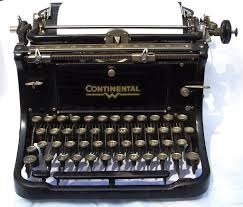Lies They Tell Writers, Part 21: THIS is how you write.

Consider writing. We do that here all the time. But, this time, let’s consider the physical process of arranging words. I do it on a computer keyboard, using the default word-processing program that shows up on most such machines. Some people I know use computers armed with fancy programs that perform all kinds of intricate tasks that help with the minutiae of writing books. Those things have never interested me, but to each his own. Some people I know write splendidly on typewriters, including poet Paul Zarzyski and novelist Loren Estleman. One of my favorite authors, Wendell Berry, writes with pencil and paper. Patrick Dearen writes on paper as he walks the streets in the night. Whatever works.But there are people who think they know best, and believe their way of writing is superior—not only for themselves, but for the rest of us wretches who write otherwise and are too ignorant to know better.I recently read a quotation by an author (who shall remain nameless, but if you really want to know I’ll fill you in) who writes longhand. He says, “Nothing compares with the fluidity of longhand. You shift things around without shifting them around—in that you merely indicate a possibility while your original thought is still there. The trouble with a computer is that what you come out with has no memory, no provenance, no history—the little cursor, or whatever it’s called, that wobbles around the middle of the screen falsely gives you the impression that you’re thinking. Even when you’re not.”Fluidity. A fine word. The fluid that flows in longhand may well be sublime. It could just as easily be sewage. If said author wants to write longhand, fine. But to imply—no, out and out say—that writers who don’t, don’t think as well as he does is, to put it politely, what originates in a male bovine and becomes sewage.THIS is how you write: however YOU want.
Published on November 13, 2015 10:23
No comments have been added yet.



